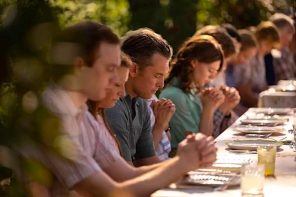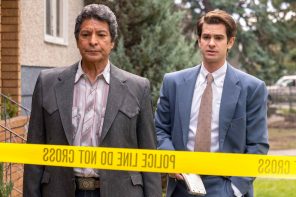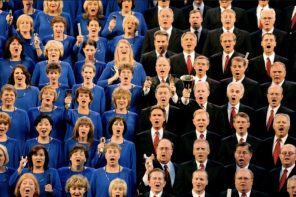Last weekend, more than 300 people attended the three-day “Circling the Wagons” conference of LGBT and SGA Mormons in Salt Lake City, including an interdenominational worship service on Sunday morning. On Sunday evening, the Salt Lake Tribune reported that speaker Kevin Kloosterman, an LDS bishop from Illinois, had said that “the way gays are treated and perceived by The Church of Jesus Christ of Latter-day Saints is an ‘atrocity”— an inaccurate report, according to conference attendees.
I spoke with Bishop Kloosterman Sunday night to hear his side of the story. (A full transcript of Bishop Kloosterman’s talk is available here.)
How did you come to be involved in the Circling the Wagons event?
Over the last year, I was feeling promptings from the Spirit to learn more about LGBT issues. I’ve never had to deal with that issue with myself, in my immediate family, in my extended family, or as a bishop. I have no close friends at all who are gay or lesbian. I really just felt the Spirit prompt me that I had to learn and listen and read more. Reading and learning started to change my heart. I had ignorance and fear about these issues. I never acted out in hateful ways but I always felt like we needed to defend marriage and the family. Then, I began to realize that my marriage and my family were not under attack by gays and lesbians. I came to realize that they were suffering much, much more than my concerns over marriage and family. Then, I heard about the three recent attacks on gay men in Utah, and when I heard that one of them basically got his jaw broken on the side of a curb, something inside me . . . my heart broke. I realized that I could no longer sit on the fence, or shake my head and walk on the other side of the road, like a Levite or a priest, but I needed to be a good Samaritan. I feel that covenant I made at baptism to take upon myself the name of Christ.
So through your research on gay issues, you found out about the conference and decided to attend.
Yes. And then the conference organizers they asked me if I would conduct the Saturday closing session and speak on Sunday at the interdenominational service.
What did you hope to say?
I had prepared something to say but then one of the organizers of the event said the theme of this service is “finding peace” or “how do you find peace.” So, I chucked my talk and spoke from the heart.
That’s a fine Mormon tradition.
Yes. President Boyd Packer said prepare, prepare, prepare, and then chuck your notes, and let the Spirit guide. That’s what I did. I was trying to convey my own journey: how as I learned about gay suicides and violence against LGBT people, the pain and tragedy burdened my soul. So, I undertook a repentance process. I turned to the Savior and went to the [LDS] temple to try to find peace. I also made steps towards making restitution, trying to listen to the experiences of gay people, creating friendships, coming to this conference. And as I stood at the pulpit, I said, “Some have called it a tragedy. I call it an atrocity, what has happened.”
What did you mean when you said, “what has happened?”
The culmination of all the suffering gay people have suffered and struggled through—gay suicides, in particular. This is about centuries and centuries of homophobia around the world, in every religion, and in the LDS Church too. Everywhere, in varying degrees, there has been hostility and violence towards LGBT people. And the emotional pain as well of not feeling welcome, supported, and connected. The leadership of the LDS Church has taken a lot of steps forward, and I’ve been really happy and excited about it. In trying to become more educated on gay issues, I’ve felt in alignment with Church leadership. I think it’s fair to say that some of the LDS membership has not completely caught up to where the leadership is now.
When you used the word “atrocity” to describe the world’s history of mistreatment of LGBT people—that’s a very strong word, and the way the Salt Lake Tribune reported it makes it sound like you were criticizing the Church and its leaders. Was that your goal?
No. The way the Tribune reports it takes my words out of context. I was not criticizing the Church. In fact, I felt and feel like we needed to support the leadership of the Church in their movements forward with our gay brothers and sisters. I did use strong words and strong imagery. Trying to convey the pain I’ve felt realizing what gay and lesbian people have gone through, I quoted a scripture in Zechariah [Zechariah 13:6] where someone—who Mormons interpret as Christ—comes and shows wounds, and he says, “I was wounded in the house of my friends.” I used that imagery to characterize the scars of gay and lesbian people. I know it’s strong imagery. I just feel really mournful about what they have been through. All of these realizations are very new to me, and it’s still quite raw. I was trying to convey that I’ve felt a small sliver of what gay and lesbian people have gone through, and I’ve found strength and peace in the Savior.
Tomorrow, you go home and return to your responsibilities as a regular LDS bishop. Given the intense scrutiny that gay issues in the LDS Church attracts, I’m betting your remarks are going to get some attention.
I’m not anyone special. I just have had a really profound spiritual experience that led me to want to move off the fence in regards to gay and lesbian issues. There is always room to help people feel more loved and welcome and safe and secure and blessed. That’s what I want to do. I want to be that type of person for our gay brothers and sisters, and for everyone. I love the Church. I don’t want the Church put in a bad light. I think there’s things we need to do differently, but nothing in my remarks today should be understood as anything other than an expression of love for my faith and all the people in it. It’s more than a church for me. It’s home.
[For a history of the Church’s evolution on LGBT issues, see this post by Kaimi Wenger at Times and Seasons.]




